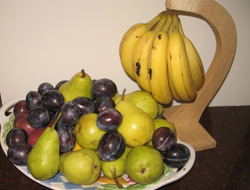Get Healthy for Life: part 2, Diet "know-how"
Published: August 28, 2020
Part 2: Eat well and be active: "Diet Know-how".
This is the second article in a series of articles related to achieving health for life and specifically considers diet and what to look for to achieve a healthy diet that’s right for you.
The other articles in the series are: "Eat well and be active! Beware of fads", "Eat well and be active: Putting the “best” foot forward", and "Eat well and be active: Making changes".
Before you read any further, take a few moments to think about why you want to change your diet or eating plan.
Do you have health issues such as high blood pressure, high blood cholesterol or high blood glucose levels that need to be addressed?
Is your goal to shed a few kilograms or pounds for a special birthday, reunion, or a wedding? Perhaps you want to put on weight and/or make sure your diet provides for your active lifestyle.
Write down what you really want to gain from you new eating plan (diet). How will you know if your new plan is successful?
Do you have a timeline for results? Are the changes you want to make intended to be long term? Once your goal is attained how will it affect your eating plan?
Knowing what your goals are will help you determine your personalised eating for health plan.
While your dietary goals may not specifically be about health you probably don’t want to put your health at risk by eating unhealthily.
Regardless of your reasons for changing your diet, a healthy diet should provide you with:
- Balance of all the nutrients that your body needs to be healthy
- Adequacy or enough of each nutrient so that you body functions optimally
- Moderation so that you can enjoy a wide variety of foods and beverages
- Variety so that you won’t get bored with your eating plan
- Cost effective so that your eating plan fits your financial plan
- Adaptability so that other people you cook for can eat the same meal
Balance
A healthy diet will provide you with all the nutrients you need for optimal health.
The food and beverages you consume should not provide you with too much of one nutrient and not enough of another.
References
1.
Whitney, E. & Rady Rolfes, S. (2005). Understanding Nutrition. Belmont, CA: Thomson Wadsworth

